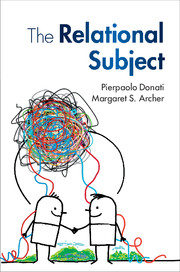2 - The Plural Subject versus the Relational Subject
from Part I
Published online by Cambridge University Press: 05 July 2015
Summary
In ordinary life, we, qua individuals, often speak in the plural referring to a ‘We’. People say: we had lunch together, we went on holiday together, we wrote a book together, we furnished our house together, we had the same opinion about that, and so on and so forth. This ‘we’ is a term whose referent remains unspecified and serves only to indicate who was involved in an event. Its reality is taken for granted in everyday life. If one asks people to say what constitutes the ‘we’ they are talking about, most likely they will indicate a number of individuals and/or give a list of names, starting or ending with I myself. In ordinary language use, the ‘we’ appears to refer to an aggregate of people, seemingly wanting, doing, or thinking the same thing.
However, most philosophers and social scientists agree that the ‘we’ cannot be a simple aggregate of individuals who are supposed to share an idea, an action or a purpose. There must be more than that, but when they try to give an explanation of what lies behind the ‘we’, they also differ greatly in their accounts of it. The understanding of what constitutes the ‘we’ – in terms of intentions, beliefs, opinions, attitudes, orientations, thoughts, and actions – is crucial in comprehending most, though not all, aspects of the social. Therefore, it becomes essential to reach a clearer and sounder view of the ‘we’ as a social subject.
In this chapter, we begin (please, note that whenever one of us speaks each of us does so as part of a ‘we’) by considering the notion of the ‘Plural Subject’, which has received a lot of attention as a generic answer to the question about who and what the ‘we’ is that is so influential in social life. We want to show that the explanations of ‘Plural Subject’ theorists are both ill-founded and inadequate for the job.
Information
- Type
- Chapter
- Information
- The Relational Subject , pp. 33 - 76Publisher: Cambridge University PressPrint publication year: 2015
Accessibility standard: Unknown
- 8
- Cited by
